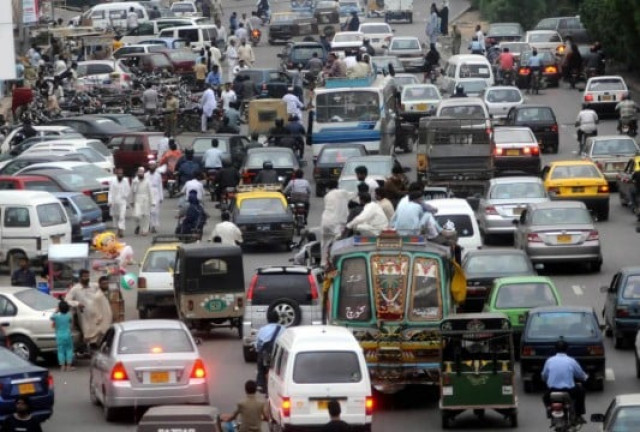Noise pollution: Amid honking horns and rickety rickshaws
Traffic noise causing health hazards and inconvenience to residents.

The droning hum of traffic has exposed the people of Haripur to multiple health hazards as the noise level exceeds the permissible limits set by the National Environmental Quality Standards (NEQS), The Express Tribune observed here on Wednesday.
The increasing density of traffic, particularly antiquated buses, vans and trucks that are in frightening condition, and two-stroke rickshaws that sound like jackhammers, are permanent sources of noise pollution in the city. Local physicians believe they are key factors in the incidence of disorders like hearing impairment, hypertension and heart problems among the local populace.
The government has banned manufacturing and registration of two-stroke rickshaws across the country, but the lenient attitude of local authorities has given a free hand to over 2,000 operators of run-down rickshaw to ply on city roads.”They cannot ban us because we pay taxes and grease their (police, motor vehicle examiners) palms,” said a rickshaw driver proudly.
When the rickshaw service was first introduced, leading to the abandonment of the centuries old mode of transportation, tongas (horse-drawn carriages), the district administration had allowed the registration of only 120 rickshaws in Haripur city in 1994. A decade and a half later, the number of rickshaws inflated to over 4,500, with fifty per cent of the two stroke models being those rejected and banned in Karachi, Lahore, Peshawar Banu and Kohat as they were in dilapidated condition and adding to traffic and pollution.
“These noisy machines have given every third person hypertension and hearing problems, just because of the authorities’ negligence,” said Nawazish Malik a government employee. He said that if local Motor Vehicle Examiner Authority’s officials and traffic police had realised their duties, the health of hundred thousands of citizens could have been saved.
Although there is no available mechanism to measure the ear-piercing sound created by vehicular traffic, some NGOs working on pollution issues believed that it is far beyond the NEQS limit.
According to local environmentalist Salman Khan, the permissible noise limit for new vehicles under the NEQS is 85 decibels and is not set for old vehicles, which accounts for 90 per cent of traffic in Haripur. A two-stroke rickshaw produces noise levels over 120 decibels, which is dangerous for health, Khan added.
Dr Muhammad Yousaf, a local ENT specialist, confirmed that vehicular noise not only affects hearing, but also triggers psychological and physiological ailments such as blood pressure, hypertension, increased heart rate and shortness of breath, stomach problems, stress, and disturbed sleep patterns. Explaining hearing impairments, he said that if an eardrum is damaged, it cannot regenerate again. Yousaf claimed that 30% of the patients at District Headquarter Hospital complain of hearing problems, largely due to the high vehicular noise levels. He suggested.
He said that to getting rid of this problem the noise monitoring mechanism should be devised and laws aimed at curbing this menace should be implemented in letter and spirit.
The Superintendent Police Headquarter Muhammad Najib Bhagvi informed The Express Tribune that his department is making efforts to curb noise pollution and imposing fines on the outdated and smoke emitting vehicles responsible for increasing noise pollution.
Published in The Express Tribune, August 9th, 2011.



1724319076-0/Untitled-design-(5)1724319076-0-208x130.webp)















COMMENTS
Comments are moderated and generally will be posted if they are on-topic and not abusive.
For more information, please see our Comments FAQ